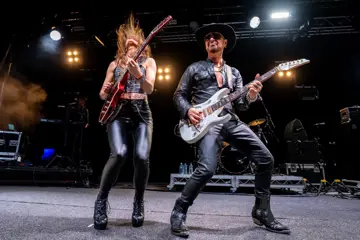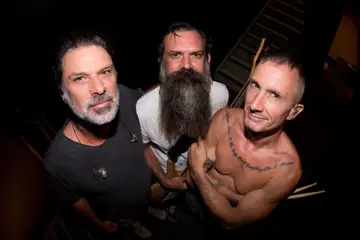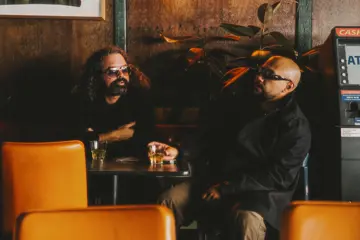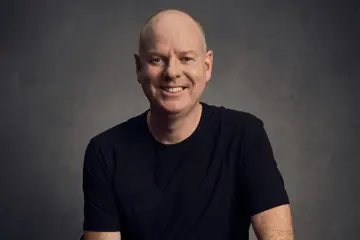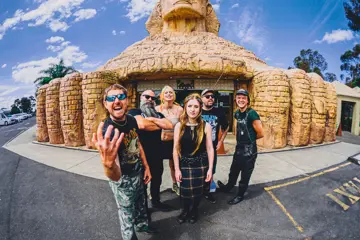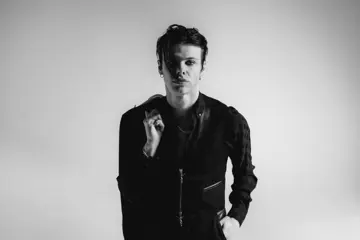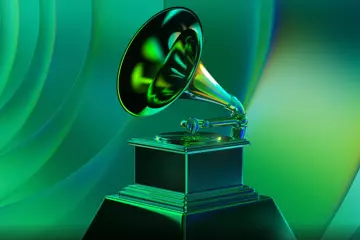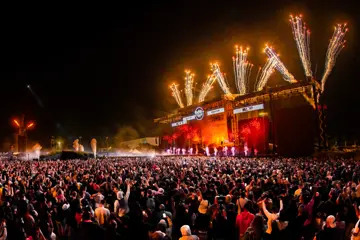AMERICAN MADE

It’s Scorsese cinema, with smirking Tom Cruise riding shotgun. He plays a Maverick pilot turned Cocaine Cowboy: running drugs for Colombians and guns to Nicaraguans; in bed with the CIA, cartels, and contra fighters. Director Doug Liman —reunited with Cruise after 2014’s great Edge Of Tomorrow, and follow fast on the footsteps of his low-budget side-project The Wall — raids that familiar grab-bag of Scorsese flash: rapid-fire montages set to classic-rock-radio staples, showing the good times rolling and the money piling up. “By the Summer of '82, business was aboomin'!" Cruise yodels in voice-over; and the film is filled with this kind of cutesy dialogue, not to mention the cutesier evocations of the period past.
Liman keeps things brisk, the pace ticking: there’s storylines told in rapid-fire montage bursts, lots of planes moving across maps (and moments mocking that trope), and even an animated interlude in which Cold War arms-dealing in Central America is told with Eagles, Bears, and a mock-education-film look.
The film fetishes the recent past, and its not-so-recent technology: the opening Universal logo is soon record-scratch replaced by a vintage Universal logo, and, from there, a montage sets the '70s scene with rollerskating, disco-dancing, and Jimmy Carter. The closing credits deliver luridly-coloured slides buzzing with a staged VHS wobble. And, in between, Cruise’s character delivers a host of to-camera, proto-selfie testimonies, which come replete with video-dates (late-'85, early-'86) imprinted on the footage. Even the TV-tight aspect ratio of 1.85:1 evokes video more than it does celluloid.
The script — by Gary Spinelli — plays fast and loose with the life of Barry Seal, having a riot with the most ridiculous, audacious elements of his life story. Here, the CIA plays just as fast-and-loose with the law: happy to aid cartels if it means overthrowing communism; happy to look the other way when one of its insiders — and/or 'independent contractors' — is up to all manner of no good.
Don't miss a beat with our FREE daily newsletter
Spinelli is so drawn to the most lurid, absurd elements — wild nights of bacchanalia at Pablo Escobar’s palatial compound, one of Cruise’s drug-running pilots falling asleep at the wheel of his plane, bags of cash piling up to the point of inconvenience, Nicaraguan Contras being uninterested in actually fighting, Ronald Reagan becoming President after making Bedtime For Bonzo — that, here, Seal’s life plays as comedy.
American Made is full of jokes, bluster, bravado. There’s a sense of boisterousness, the film a story equal parts historical record, comic romp, and redolent bullshit. There’s a great recurring gag where Cruise asks wife Sarah Wright Olsen if she trusts him, and receives answers in the negative. Olsen gives a great turn as a pissy, provocative, take-no-shit love-interest; Domhnall Gleeson looks happy to be wearing a beard and out in the sunshine, stuck no longer on a Star Wars digital backlot; and Caleb Landry Jones routinely steals the show with another skin-crawling turn, this time as shirtless, redneck, idiotic brother-in-law.
But the star, here, is Cruise, of course: American Made made as an old-fashioned star vehicle. He’s in every scene, serves as the narrator, and throws himself into this tall, tall tale. With his blinding teeth and movie-star charisma on show, it’s familiar Cruise; especially given he’s back in the cockpit, a pilot pulling off crazy manoeuvres in the sky. But, for the first time in a long time, Cruise feels as if he’s playing a character, not just forwarding his brand and/or KSW. His anti-hero is not entirely bright and quietly insecure, a fool who’s flying-high, but bound, by the end, to have fallen hard.
THE CIRCLE

The Circle was sold to the world as a paranoia-thriller, Emma Watson the cubicle-worker who, upon getting a job at a Google-esque tech monolith, sees past the pétanque courts and enforced fun, and knows that dark secrets lurk within. Perhaps this is why the film tanked with both critics and audiences upon its release earlier this year: because, in no way is this a thriller of any kind, and anyone who expects such will leave disappointed.
James Ponsoldt's adaptation of Dave Eggers' novel is closer to satire; though, there’s not enough jokes to live up to that billing, either. Instead, what you get is a commentary on the online issues of the day — privacy vs transparency, social media witch-hunts, the fatigue of living an ever-online life in the digital surveillance state — told with a disappointing amount of convention, and a strange lack of verve. It’s not bad, it just kind of… is; the conspiracy-thriller machinations never kicking in, the parable for modern-life floated like a balloon, left to linger in the air. A movie about mob mentality in which everyone is always filming everything on their phone, and a corporate conglomerate wants to record everything in the world ("All Seeing" is literally their catch-phrase), should be more vicious, pernicious than this.
So, the yarn goes: Watson gets a job at The Circle, and climbs the corporate ladder in a flash, due to both dumb luck and marketing nous. In keeping with the company's belief in radical transparency — employees tracked, children microchipped, politicians making all emails public; a host of collected data stored in a central hive-mind — she pledges to live her life constantly online, surrounded by cameras.
It proves a fine way to win favour with the CEO/COO (a Hanksy Tom Hanks and a frowning Patton Oswalt, respectively), but a great way to lose friends and alienate people. As Watson lives life as one elaborate, vainglorious selfie, the screen of Ponsoldt’s film fills with red comments, which often serve as meta-commentary on the movie and its themes. "Anyone else feel like we’re in the prologue of a disaster film?" asks one; "Isn’t this the definition of mob rule?" another.
Amongst this, Eggers writing is at its best when it's mocking the all-consuming nature of modern life, with its attendant social-media requirements; the edict that one need be performing at all times. When the super-chirpy peeps from The Circle’s Socials come around wondering about low 'participation levels', it's a new form of cult; the algorithmic rating of human experience, of being alive.
Eventually, things get dark when Watson’s childhood pal Ellar Coltrane — seemingly walked in from the Far West Texas desert he ended Boyhood 'shrooming in — is turned into a subject of social-media shaming, then made the victim of an elaborate crowdsourcing geo-locating effort, effectively a form of reality/reality-TV obliterating witch-hunting, delivered by Watson's Powerpoint presentation. This spurs her to get revenge, but it comes so quickly, and painlessly, that it feels almost anticlimactic; the comeuppance for our corporate overlords just being its own kind of online shaming. It's an ending more wry than anything; in keeping with a film that doesn’t know whether it's marshalling outrage or laughs, and doesn't deliver enough of either.

